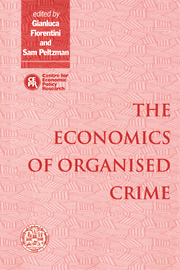Book contents
- Frontmatter
- Contents
- List of figures
- List of tables
- Foreword
- Acknowledgements
- List of conference participants
- 1 Introduction
- PART I THEORIES OF THE STATE AND THE ORIGIN OF CRIMINAL ORGANISATIONS
- PART II THE CRIMINAL ORGANISATION AS A FIRM
- 4 Internal cohesion and competition among criminal organisations
- Discussion
- 5 Conspiracy among the many: the mafia in legitimate industries
- Discussion
- PART III ORGANISED CRIME AND STATE INTERVENTION IN THE ECONOMY
- PART IV DETERRENCE POLICIES AGAINST LEGAL FIRMS INVOLVED IN ILLEGAL ACTIVITIES
- PART V DETERRENCE POLICIES AGAINST ORGANISED CRIME
- Index
5 - Conspiracy among the many: the mafia in legitimate industries
Published online by Cambridge University Press: 04 August 2010
- Frontmatter
- Contents
- List of figures
- List of tables
- Foreword
- Acknowledgements
- List of conference participants
- 1 Introduction
- PART I THEORIES OF THE STATE AND THE ORIGIN OF CRIMINAL ORGANISATIONS
- PART II THE CRIMINAL ORGANISATION AS A FIRM
- 4 Internal cohesion and competition among criminal organisations
- Discussion
- 5 Conspiracy among the many: the mafia in legitimate industries
- Discussion
- PART III ORGANISED CRIME AND STATE INTERVENTION IN THE ECONOMY
- PART IV DETERRENCE POLICIES AGAINST LEGAL FIRMS INVOLVED IN ILLEGAL ACTIVITIES
- PART V DETERRENCE POLICIES AGAINST ORGANISED CRIME
- Index
Summary
Introduction
This paper considers the modes by which the mafia exercises its influence on a number of legitimate industries in both Sicily and the United States. In particular, it discusses the kinds of service the mafia provides, the economic consequences of its influence, the conditions that induce the entry of the mafia in specific industries, and the conditions and policies that make it disappear. We share the view that mafia protection in legitimate industries, although occasionally rapacious and unreliable, is frequently neither bogus nor limited to intimidating new entrants. Under some (perhaps most) circumstances, the primary beneficiaries are the owners of the firms being coerced.
This view is based both on theoretical arguments and empirical evidence. The paper relies on a series of case-studies which were autonomously developed by the authors and presented elsewhere (Reuter, 1987, 1993; Gambetta, 1993). The most important type of protection supplied by racketeers to legitimate industries, which is found in most industries we studied, is the enforcement of a variety of allocation agreements among independently owned firms, with racketeer income as payment for the service. This runs counter to two widespread conceptions of the involvement of the mafia in legitimate industries. One sees the racketeers’ role as mere intimidation: the mafioso approach to ‘regulated’ competition would amount to thugs resorting to muscular persuasion at the expense of an innocent competitor on behalf of either a single monopolist or the mafia's own enterprise. The other sees racketeers as extortionists imposing their presence upon harmless dealers who would rather do without. Let us consider them in turn.
- Type
- Chapter
- Information
- The Economics of Organised Crime , pp. 116 - 135Publisher: Cambridge University PressPrint publication year: 1996
- 10
- Cited by



